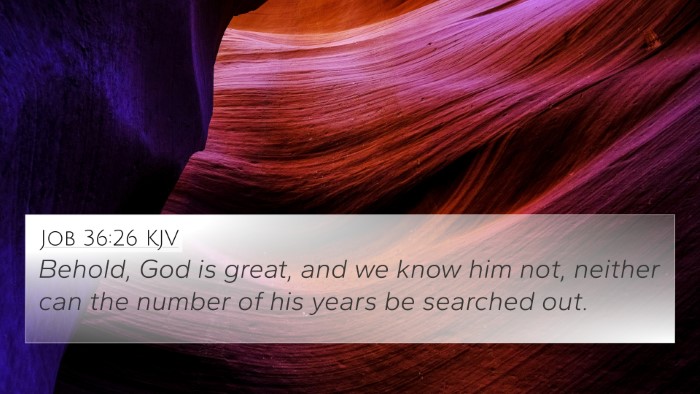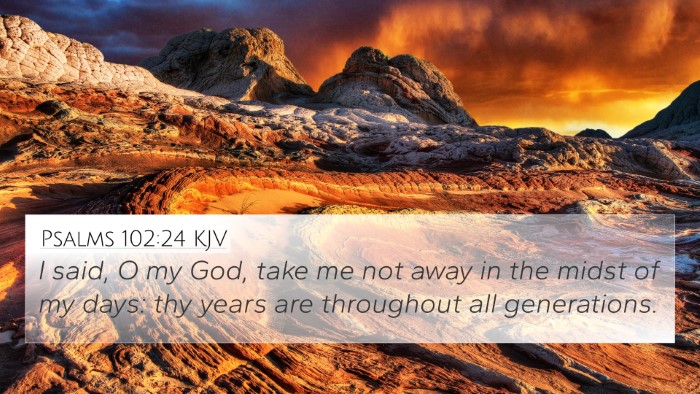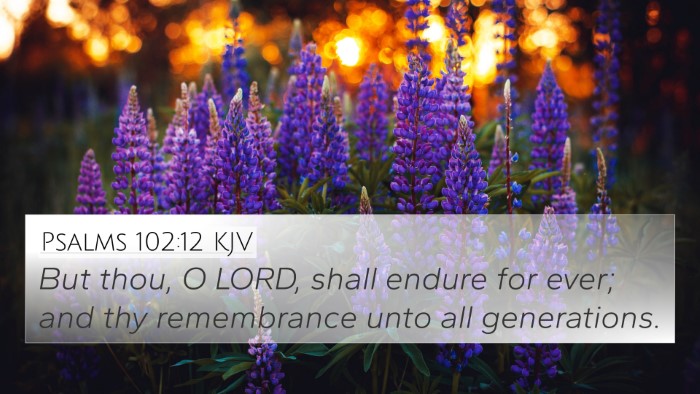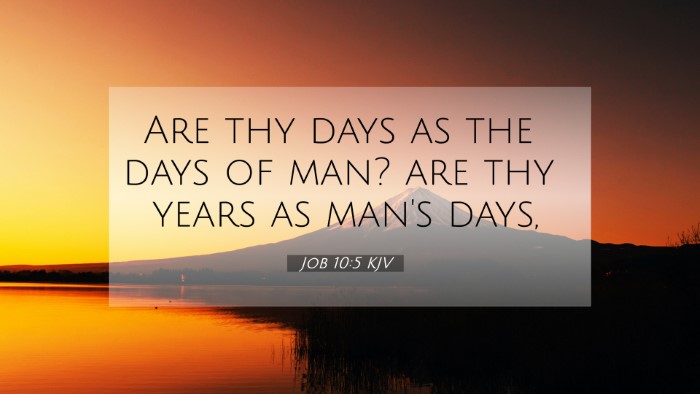Old Testament
Genesis Exodus Leviticus Numbers Deuteronomy Joshua Judges Ruth 1 Samuel 2 Samuel 1 Kings 2 Kings 1 Chronicles 2 Chronicles Ezra Nehemiah Esther Job Psalms Proverbs Ecclesiastes Song of Solomon Isaiah Jeremiah Lamentations Ezekiel Daniel Hosea Joel Amos Obadiah Jonah Micah Nahum Habakkuk Zephaniah Haggai Zechariah MalachiJob 10:5 Similar Verses
Job 10:5 Cross References
Are thy days as the days of man? are thy years as man's days,
Uncover the Rich Themes and Topics of This Bible Verse
Listed below are the Bible themes associated with Job 10:5. We invite you to explore each theme to gain deeper insights into the Scriptures.
Job 10:5 Cross Reference Verses
This section features a detailed cross-reference designed to enrich your understanding of the Scriptures. Below, you will find carefully selected verses that echo the themes and teachings related to Job 10:5 KJV. Click on any image to explore detailed analyses of related Bible verses and uncover deeper theological insights.

2 Peter 3:8 (KJV) »
But, beloved, be not ignorant of this one thing, that one day is with the Lord as a thousand years, and a thousand years as one day.

Psalms 90:2 (KJV) »
Before the mountains were brought forth, or ever thou hadst formed the earth and the world, even from everlasting to everlasting, thou art God.

Job 36:26 (KJV) »
Behold, God is great, and we know him not, neither can the number of his years be searched out.

Psalms 102:24 (KJV) »
I said, O my God, take me not away in the midst of my days: thy years are throughout all generations.

Psalms 102:12 (KJV) »
But thou, O LORD, shall endure for ever; and thy remembrance unto all generations.

Hebrews 1:12 (KJV) »
And as a vesture shalt thou fold them up, and they shall be changed: but thou art the same, and thy years shall not fail.
Job 10:5 Verse Analysis and Similar Verses
Understanding Job 10:5
Job 10:5 states: "Are your days like the days of a mortal? Are your years like those of a strong man?" This verse is part of Job's lamentation as he questions God's intent and the nature of his suffering. In this summary, insights from various public domain commentaries are synthesized to provide a comprehensive understanding of this verse.
Verse Context
This verse occurs in a context where Job, who has faced intense suffering and loss, presents a poignant appeal to God. He begins to question the reason for his suffering and God's apparent disregard for his humanity.
Interpretations from Commentaries
Matthew Henry's Commentary
Matthew Henry emphasizes Job's desire to understand if God, in His omnipotence, perceives human life as fragile and short-lived. He reflects on the brevity of human life and compares it to God's eternal existence. Henry points out Job's struggle for justification, wondering if God treats him as one of His own creations or as something lesser.
Albert Barnes' Commentary
Albert Barnes focuses on Job’s anguish and the existential questions he raises in this verse. He articulates that Job is essentially asking whether God's perspective of life aligns with the human experience of mortality. Through this questioning, Barnes highlights Job's wrestling with the concepts of divine justice and human suffering, noting that Job’s plight reflects a deep theological inquiry into God’s nature and human existence.
Adam Clarke's Commentary
Adam Clarke offers a detailed examination of Job’s rhetorical questions as he seeks to draw a parallel between the divine and the mortal. Clarke suggests that Job’s inquiries emphasize the need for God to recognize his suffering in context to the fleeting nature of human life. He points out that Job implicitly seeks a compassionate response from God, illustrating the broader theme of human plea for understanding amidst distress.
Thematic Connections
In examining Job 10:5, several theological themes emerge:
- Human Suffering: Job represents the human condition, struggling with pain and seeking answers.
- Divine Justice: The apparent silence of God raises questions about justice and mercy.
- Mortality vs. Eternity: The contrast between human fragility and God's eternal nature is a key theme.
- Existential Inquiry: Job’s questions reflect deep philosophical and theological inquiries about life's purpose.
Cross-References
Job 10:5 is related to various passages throughout the Bible that reflect similar themes of suffering, mortality, and divine justice. Here are 8 cross-references:
- Psalms 39:4-5: "Show me, O LORD, my life's end and the number of my days; let me know how fleeting is my life."
- Psalms 90:12: "Teach us to number our days, that we may gain a heart of wisdom."
- Isaiah 40:6-8: "All people are like grass, and all their faithfulness is like the flowers of the field."
- 1 Peter 1:24: "For 'All people are like grass, and all their glory is like the flowers of the field; the grass withers and the flowers fall.'
- Romans 8:18: "I consider that our present sufferings are not worth comparing with the glory that will be revealed in us."
- Ecclesiastes 3:20: "All go to the same place; all come from dust, and to dust all return."
- Job 7:17-19: "What is mankind that you make so much of them, that you give them so much attention..."
- James 4:14: "Why, you do not even know what will happen tomorrow. What is your life? You are a mist that appears for a little while and then vanishes."
Conclusion
Job 10:5 invites profound reflection on the nature of life, suffering, and God’s relation to humanity. Through cross-referencing other Bible verses, we deepen our understanding of the connections between human experience and divine reality. As one engages with these themes, it is essential to utilize tools for Bible cross-referencing to explore the layers of meaning inherent in Job's words and their implications for our lives.


